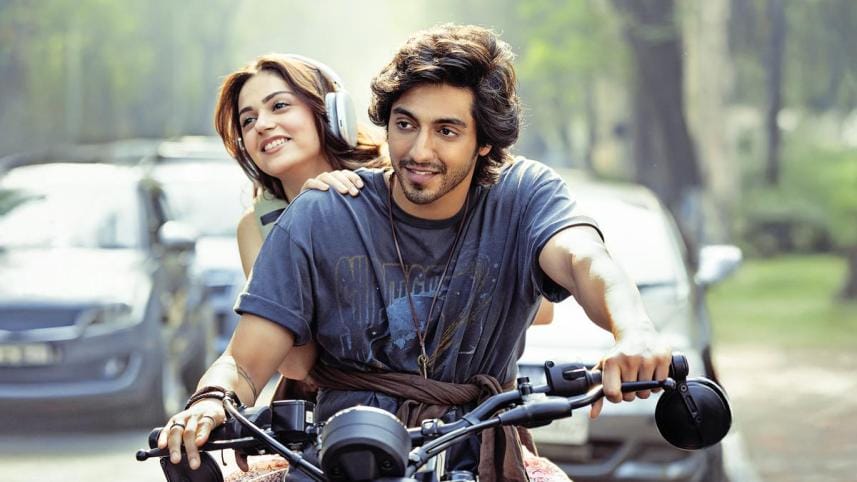Memory, music and the fragile shape of modern romance

On the surface, it is not difficult to understand why "Saiyaara" has climbed to the number-one spot on Netflix and captured the attention of an audience that has long been starved of an old-school Hindi love story. Mohit Suri's latest offering arrives at a time when romance in Hindi cinema often feels like an afterthought -- buried under spectacle, remakes, or generic romcom tropes. Yet, "Saiyaara" insists on looking directly into the eyes of love itself, and that insistence has resonated with both young viewers seeking intensity and the older ones being nostalgic for the era when music and memory were inseparable.
At its heart, the film is a story of Krish Kapoor, a volatile and ambitious young musician played by Ahaan Panday, and Vaani Batra, a lyricist played by Aneet Padda, who together discover not only the soaring highs of romance but also the fragility of time when Vaani is diagnosed with early-onset Alzheimer's. What begins as a meeting of music and words gradually turns into a meditation on the meaning of love when memory itself starts slipping away.
The opening act is strong and assured, immediately setting itself apart from the plastic romance that has plagued Hindi cinema for years. Krish is introduced as a narcissistic but talented singer who lashes out at critics being sidelined by favoritism due to nepotism. The irony of Ahaan Panday, himself a member of a prominent film family, delivering biting dialogue about nepotism is not lost on the audience, and it gives the film a cheeky self-awareness. Vaani, in contrast, is first seen through her words, not her appearance. A woman who once wrote endlessly in her diary until heartbreak silenced her pen, she became Krish's collaborator and eventually his conscience. Their initial exchanges have a spark that feels both organic and cinematic, the kind of playful tension that once defined classic Bollywood romances.
Music, apparently, is the film's bloodstream, and Suri leans heavily on it to build atmosphere and emotion. The title track, "Saiyaara", is an earworm in the tradition of his most memorable songs, and the album as a whole has enough variety to be hummed outside the theater or streamed on repeat at home. The deliberate use of music to chart the characters' interior landscapes is vintage. Suri, reminiscent of how "Aashiqui 2" or "Ek Villain" lived in the space between words and tunes. There are moments when a montage or a stage performance feels less like a set-piece and more like an externalization of Krish or Vaani's inner turmoil, blurring the line between character and melody. For many viewers, it is the music that will stay longer than the story, which is perhaps fitting since the entire narrative is about how memory can fade but emotion lingers through song. Precisely, this marriage of memory and music also makes "Saiyaara" feel vulnerable to overindulgence. The script, credited to Sankalp Sadanah, has flashes of genuine insight, particularly in the way Vaani's condition destabilizes Krish, forcing him to reconsider his own ego and ambitions, but it also stumbles into convenient plotting and melodrama. The portrayal of Alzheimer's, for instance, often feels opportunistic. Vaani remembers when the story needs her to remember and forgets when the story needs her to forget, which undercuts the gravity of the disease and reduces it to a narrative device. The climax, in particular, strains logic and patience, leaving an aftertaste of contrivance that the strong opening act had promised to avoid.

"Saiyaara" falters most in its uneven tonal shift between the two halves. The first half, full of spark, music, and witty dialogue, feels like a film in conversation with its audience, aware of both nostalgia and present anxieties. The second half, however, leans heavily on melodramatic turns, including the return of Vaani's exploitative ex-fiancé and a prolonged missing-person subplot that stretches plausibility. The narrative becomes increasingly synthetic, as if the filmmakers lost trust in the raw power of the central romance and decided to pile on external obstacles for impact. Still, the film's flaws are not enough to eclipse its ambitions. There is a sincerity in "Saiyaara" that feels rare in mainstream Hindi cinema today. While some of its beats are familiar, the bad boy redeemed by love, the heartbreak, the sacrifice, the reunion, there is an earnest attempt to modernize these tropes without stripping them of their emotional weight. The relationship between Krish and his alcoholic father, for example, provides a generational mirror to his own struggles, and though the subplot is not fully fleshed out, it grounds Krish's anger in something more than youthful arrogance. Likewise, Vaani's protective mother, played with scene-stealing sharpness by Geeta Agrawal Sharma, adds both humor and poignancy, delivering some of the film's most memorable lines about not wasting tears on the undeserving. These supporting characters enrich the texture of the film, preventing it from becoming a two-character melodrama adrift in self-pity.
Performance-wise, both newcomers are impressive. Ahaan Panday carries the physicality and screen presence of a star, even if his acting sometimes slips into a Sanjay Dutt-like hangdog expression that could quickly become mannerism if not checked. What works in his favor is that Krish is written as a character who needs to be watched as much as listened to, and Ahaan manages to make his arrogance, desperation, and eventual vulnerability believable. Aneet, meanwhile, is the real revelation. While her Vaani could easily have been reduced to the archetypal muse who heals the broken hero, she imbues her with quiet intelligence and emotional force. She is not just an accessory to Krish's journey but the moral axis of the story, and her struggle to hold on to memory lends her gaze a haunting quality that lingers long after the film ends. It is this central pairing that keeps "Saiyaara" from collapsing under the weight of its own excesses. The chemistry between Krish and Vaani is neither frivolous nor exaggerated. It has a lived-in quality that allows the audience to invest in them even when the script falters. Together, they give the film its pulse, turning what could have been a derivative melodrama into something intermittently moving.
Yet, the film also raises an uncomfortable question about the state of Hindi romance itself. Must every modern love story be filtered through illness, trauma, or tragedy to feel significant? "Saiyaara" seems to believe so, and while that approach yields a handful of striking moments, it also makes the genre feel trapped in a cycle of suffering. Perhaps, what audiences are responding to, given its Netflix triumph, is less the novelty of the story and more the sincerity with which it reclaims the musical romance as a serious mode of filmmaking. Even when the plotting strains credibility, the film's heart is firmly in the right place, and for now, that may be enough. And perhaps, that is what keeps "Saiyaara" perched at number one. For all its flaws, it offers something Hindi cinema has been reluctant to provide in recent years: a romance that takes itself seriously. And in doing so, it taps into a reservoir of nostalgia and longing, reminding us that while memory may fade, the emotions stirred by a song, a glance, or a line of dialogue can linger far longer.




 For all latest news, follow The Daily Star's Google News channel.
For all latest news, follow The Daily Star's Google News channel. 
Comments